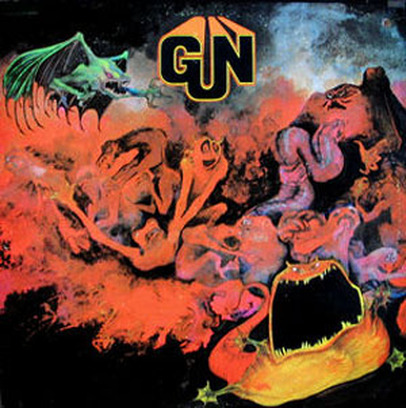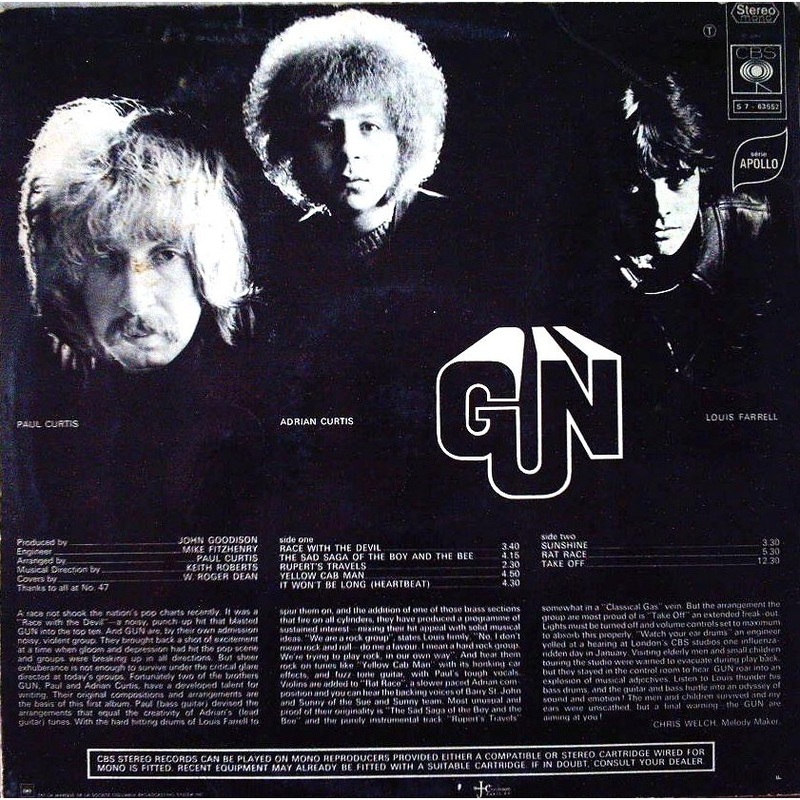The year was 1968 and Cream, that most awesome of super-groups had disbanded due to the acrimonious tendencies of its rhythm section. Unfortunately, without the bass and drums of Jack Bruce and Ginger Baker there wasn't much left, even if what remained was Eric Clapton at the peak of his godliness. A number of bands rushed in to fill the gap, but, it clearly wasn't going to be easy. Into the mix came a brotherly guitar and bass duo with a sound close enough to Creams to meet the demand, but distinct enough to be more than a mere imitation.
Three British lads, Adrian and Paul Gurvitz, along with drummer Louis Farrell formed "Gun" and quickly recorded their first album, charting a hit (Race with the devil) in England. The songs opening appears to intentionally echo Cream's intro to White Room, while other parts of the song call to mind another forgotten gem of the period "The Crazy World of Arthur Brown's" song "Fire." The basic riff , however, has enough muscle to stand on its own, making it more than just a pastiche of current (For the time) trendiness.
Adrian, the standout of the trio had pretty much nailed Clapton's sinewy vibrato and "Woman Tone" which in 1968 was a sufficiently worthy achievement among guitarists to inspire awe.
Unlike most of their fellow travelers on the newly emerging heavy rock scene, Gun occasionally used horns, giving them a toehold in the equally new progressive rock scene.
In 1969 the band followed up with a second album that went nowhere and then promptly broke up. Gun never really achieved noteworthy success in the U.S., although they were a part of the growing underground during the music's infancy.
Adrian eventually hooked up with the aforementioned Ginger Baker in the equally short lived "Baker Gurvitz Army." A decade or so later he entered into the most lucrative phase of his career as an award winning songwriter for films like "The Bodyguard."
Melody Maker at one time named Adrian as the ninth greatest guitarists in the world, which seems an oddly specific number when attempting to quantify guitar awesomeness, but, such is the nature of pop culture.
Gun remain a compelling, although largely forgotten chapter in the evolution of hard rock in its embryonic stage. Their first album is something of a forgotten near-classic for aficionados of the form, with a very cool album cover, to say nothing of the devilish lyrical imagery that only a year later would pay off big-time for another British band.
Either way, dig their raucous, youthful, heaviness and check them out. You will be too cool for the sheer obscurity of it all, and you'll hear some pretty imaginative music in the process.
Mark Magula
Three British lads, Adrian and Paul Gurvitz, along with drummer Louis Farrell formed "Gun" and quickly recorded their first album, charting a hit (Race with the devil) in England. The songs opening appears to intentionally echo Cream's intro to White Room, while other parts of the song call to mind another forgotten gem of the period "The Crazy World of Arthur Brown's" song "Fire." The basic riff , however, has enough muscle to stand on its own, making it more than just a pastiche of current (For the time) trendiness.
Adrian, the standout of the trio had pretty much nailed Clapton's sinewy vibrato and "Woman Tone" which in 1968 was a sufficiently worthy achievement among guitarists to inspire awe.
Unlike most of their fellow travelers on the newly emerging heavy rock scene, Gun occasionally used horns, giving them a toehold in the equally new progressive rock scene.
In 1969 the band followed up with a second album that went nowhere and then promptly broke up. Gun never really achieved noteworthy success in the U.S., although they were a part of the growing underground during the music's infancy.
Adrian eventually hooked up with the aforementioned Ginger Baker in the equally short lived "Baker Gurvitz Army." A decade or so later he entered into the most lucrative phase of his career as an award winning songwriter for films like "The Bodyguard."
Melody Maker at one time named Adrian as the ninth greatest guitarists in the world, which seems an oddly specific number when attempting to quantify guitar awesomeness, but, such is the nature of pop culture.
Gun remain a compelling, although largely forgotten chapter in the evolution of hard rock in its embryonic stage. Their first album is something of a forgotten near-classic for aficionados of the form, with a very cool album cover, to say nothing of the devilish lyrical imagery that only a year later would pay off big-time for another British band.
Either way, dig their raucous, youthful, heaviness and check them out. You will be too cool for the sheer obscurity of it all, and you'll hear some pretty imaginative music in the process.
Mark Magula


 RSS Feed
RSS Feed